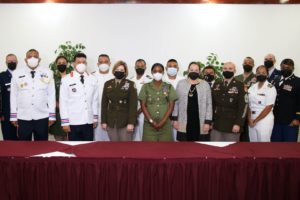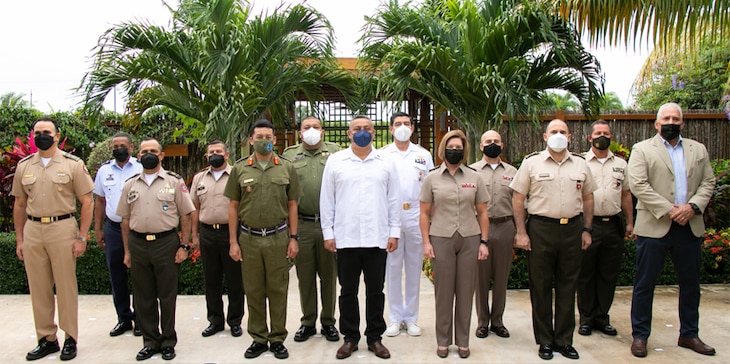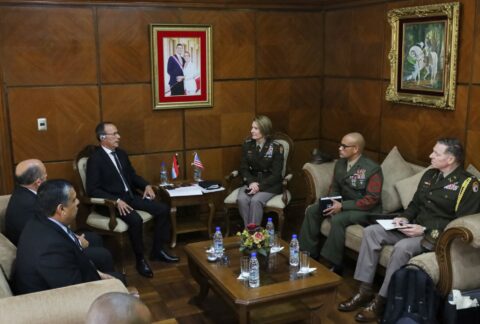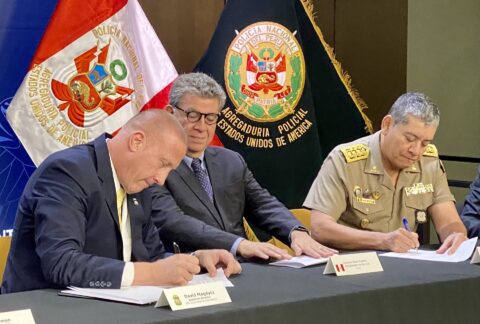The nations of Central America and the Caribbean must work together with friends and allies to confront the problems of the future, U.S. Army General Laura J. Richardson, commander of U.S. Southern Command (SOUTHCOM) told participants of the Central American Security Conference (CENTSEC) in Belize, on February 1.
Gen. Richardson noted that the countries share democratic values and ethos, a good basis upon which the militaries of the region can cooperate. The meeting brought together Defense ministers, public security ministers, and chiefs of Defense from Belize, Costa Rica, the Dominican Republic, El Salvador, Guatemala, Honduras, and Panama, as well as representatives from Canada, Colombia, France, Mexico, the Netherlands, and the United Kingdom.

Gen. Richardson did not make light of the problems confronting the region, which require cooperation at all levels. “We are also connected by the cross-cutting threats we face, and the collective challenges they pose,” she said, noting the challenges of COVID-19; transnational criminal organizations that engage in drug, arms, and human trafficking; state-sponsored hacking and disinformation campaigns; as well as natural disasters. “We must work together to keep our region — our neighborhood — safe.”
Gen. Richardson pointed to “integrated defense” — a term popularized by U.S. Secretary of Defense Lloyd J. Austin III — as a strategy to face these myriad challenges. “[Integrated defense] means bringing all allies and partners together, and using all tools available to counter threats, including different and all government agencies, the private sector and industry and nongovernmental organizations,” she said.
Gen. Richardson detailed concrete steps to help the nations of the region cooperate. CENTSEC is one area of its own. The conference, she said, allows partners to synch up with each other, to share best practices and to gain an understanding of shared threats. All this enhances interoperability.
Gen. Richardson would like to increase opportunities for regional allies to participate in the U.S. international military education and training program, and for U.S. personnel to work with their Central American counterparts. She pointed to the upcoming exercise in Honduras — Fuerzas Commando — as an opportunity.
Dealing with critical infrastructure is another area of cooperation. “The U.S. Army Corp of Engineers has been working with Panama on a water supply system that will benefit more than half of Panama’s population,” she said. “What’s more, this project is sustainable and will protect the environment.” Another project is in the Dominican Republic port of Manzanillo.
Another exercise — sponsored by the Coordination Center for Disaster Prevention in Central America and the Dominican Republic — concentrates on regional disaster relief. “SOUTHCOM’s Joint Task Force Bravo in Soto Cano, Honduras, is participating, offering humanitarian assistance subject matter expert exchanges,” she said. “Going forward, Sentinel Watch will be an annual exercise right before hurricane season, so that we’re all ready when — not if — a natural disaster strikes. And every year SOUTHCOM conducts Resolute Sentinel, where civil engineers and medical professionals provide life-saving care throughout the region. These are all great ways for us to build our readiness to respond to the next big disaster.”
Finally, the general wants to deepen existing relationships through the U.S. National Guard’s State Partnership Program. “This year, Guatemala and the Arkansas National Guard celebrate 20 years of partnership,” she said. “Last year, Belize and the Louisiana National Guard celebrated 25 years of partnership. National Guardsmen from Missouri, New Hampshire, and Puerto Rico will exchange best practices with their Central American colleagues on cybersecurity, civilian security, and disaster contingency planning.”









